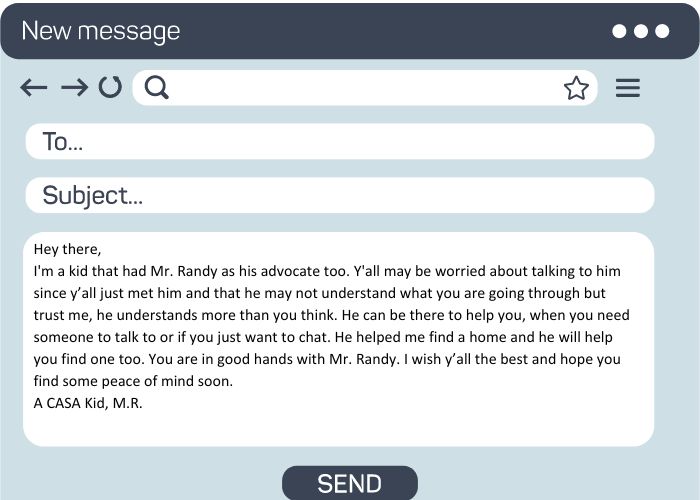Heart of CASA: January 2024
The Heart of CASA is a series to highlight the aspects of our volunteer work. Advocacy for a child in care covers several activities from court hearings to visits with a child to conversations with parents. Each month, we’ll share a story of a small (or big!) moment from one of our cases that exemplifies what advocacy can mean to a child and their families.
CONNECTION TO an advocate
 After his child welfare case closed, seventeen-year-old Mark* asked his Advocate, Randy*, if they could stay in touch. The teen was permanently living with his paternal grandmother after the court granted her guardianship. During the case, Randy found the paternal grandmother and fostered the relationship between them, eventually supporting her being named as Mark’s permanent caregiver. Every month, Randy and Mark sent each other emails or talked on the phone. When Randy went on vacation and passed by Mark’s new home about two hours away, he stopped by to say hello to Mark and his grandmother.
After his child welfare case closed, seventeen-year-old Mark* asked his Advocate, Randy*, if they could stay in touch. The teen was permanently living with his paternal grandmother after the court granted her guardianship. During the case, Randy found the paternal grandmother and fostered the relationship between them, eventually supporting her being named as Mark’s permanent caregiver. Every month, Randy and Mark sent each other emails or talked on the phone. When Randy went on vacation and passed by Mark’s new home about two hours away, he stopped by to say hello to Mark and his grandmother.
During one of their conversations, Mark asked Randy if he still volunteered with Child Advocates. Randy said yes but did not provide any details about his new case. Later that week, Mark called him and asked if he could call the new kids on Randy’s case. Randy said that wouldn’t work due to confidentiality, but if Mark wanted to write a letter, Randy would give it to them.
“I had no idea what Mark wanted to say or share,” Randy said. “He was a very reserved boy throughout the case because of the things he’d experienced. He was always very polite, but short on words with me, so I never knew how he felt about my advocacy or if he knew how much I was doing behind the scenes to find him permanency.”
an unexpected blessing
Later that week, Mark’s email arrived in Randy’s inbox:
Hey there,
I’m a kid that had Mr. Randy as his advocate too. Y’all may be worried about talking to him since y’all just met him and that he may not understand what you are going through but trust me, he understands more than you think. He can be there to help you, when you need someone to talk to or if you just want to chat. He helped me find a home and he will help you find one too. You are in good hands with Mr. Randy. I wish y’all the best and hope you find some peace of mind soon.
A CASA Kid, M.R.
“It was a blessing to get that feedback,” Randy said. “As Advocates, we have to believe that we have an impact on a kid and that we’re doing the right thing. I didn’t know if he saw what I was doing [during the case]. His letter made me realize that he saw my efforts and appreciated what I was doing.”

breaking through barriers
True to his word, Randy printed out three copies of the email and brought them to the three teenage boys in his new case.
“The boys had a massive defense up against anyone trying to help them because of the abuse they’d suffered,” Randy said. “It’s not easy to break through those barriers. Having another teen I advocated for say ‘Hey, you can trust this guy!’ helped me build a relationship with these kids.”
One of the challenges Advocates have in a new case is establishing trust with the children they serve. In most child welfare cases, children have already been disappointed by many adults in their lives, and they are hesitant to trust a stranger. The Advocate hopes that through consistency, respect, kindness, and compassion, the relationship can grow so that the child can share their wishes and concerns with the Advocate.
OPening up
Randy said the youngest child in his new case (10 years old) read the letter and said, “OK.” The oldest child (17 years old) asked Randy, “This is from a real kid?”
“He was touched by the letter,” Randy said. “After reading it, he changed the way he treated me. It made him receptive to me.”
Randy said the middle child (13 years old) is a thinker, so it took him a while to process what the letter meant. During the next several visits, though, Randy noticed the middle child was more relaxed and open to talking with me.”
Open, honest communication
Looking back on his first case with Mark, Randy said he tried his best to speak openly and honestly with the teen. Mark knew the situation was serious, and Randy worked to help him understand it. “I never promise anything, because I don’t make decisions,” Randy said. “I always informed Mark of what I was working on and what my recommendations would be in court, but I always made sure he knew that the Judge would make the final decision. He saw the things I was working on happen—he knew he could trust me because I’d always been upfront with him.”
*Names changed for privacy
CHANGE A CHILD’S STORY TODAY. IMPACT OUR COMMUNITY FOREVER.
Learn more about becoming a CASA volunteer: VOLUNTEER or give online DONATE
